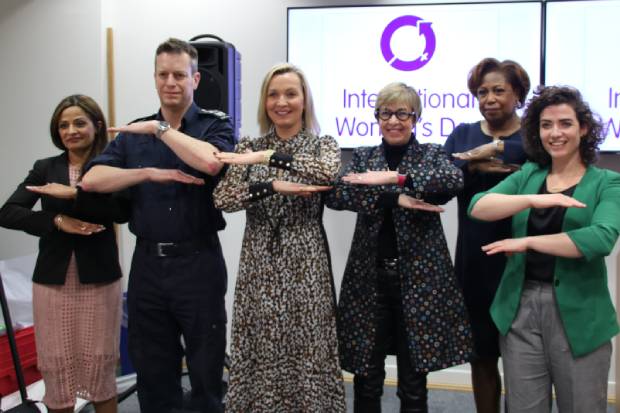
The theme for this year’s International Women's Day (IWD) was #EachForEqual.
The Home Office marked the annual celebration by hosting a seminar with five influential, straight-talking female leaders from the worlds of sport, finance, publishing and the media. The Civil Service used the hashtag #awomanwhoinspiresme to engage staff and acknowledge the achievements of women across the organisation.
The panel was challenged to explore issues around accountability, the slow pace of change and the role of men in making gender parity a reality.
There was broad agreement that diversity – in all its forms – drives innovation.
But the question remains: Are we still making progress? How can organisations move the needle on inclusion and improve representation at all levels in the workplace if the pipeline of potential leaders with diverse talents and backgrounds is thin?
Focus on inclusion
Pamela Hutchinson, Global Head of Diversity and Inclusion at Bloomberg LP, believes magic happens when senior leaders, rather than sitting back, push the equality agenda and lead from the front.
Committed leaders make it their mission to ensure everyone understands the benefits of inclusion to the organisation, by setting targets around recruitment, retention and advancement rates.
“Accountability is key to driving diversity and inclusion right through the organisation,” she said.
The bigger worry, Ms Hutchinson argued, is the issue of intersectional inequality – recognising that women from ethnic minority backgrounds face multiple hurdles that prevent them from reaching senior leadership positions.
“If we are not looking out for women in all their diversity, then I don’t believe we are being very true to the cause,” she added.
Brenda Trenowden CBE, co-chair of the 30% Club, a campaign group that works to improve gender parity in the boardroom and beyond, agrees.
Research by the 30% Club suggests companies with more women on their boards perform better than their competitors, are more profitable and forward-thinking.
To keep things moving in the right direction, Ms Trenowden believes employers need to invest in sponsorship to deal with imbalances and get women into key positions of power.
“We should be focusing on inclusion. I really think we need to move on from just setting targets. It’s really about inclusive cultures and allowing people to be themselves and celebrate difference,” she said.
Male advocates
While gender balance is important, achieving long-term change goes far beyond the recruitment process. Engaging men in the conversation is critical for sustained progress, as they make up a higher percentage of the top management roles.
Paul Lincoln OBE, Director General of Border Force and Gender Equality Champion at the Home Office, outlined what he sees as one of the most pressing issues for the Civil Service – making use of the data.
He explained how data is used to inform senior level discussions in the department’s diversity and inclusion steering group to understand where interventions might make a difference. Mr Lincoln also highlighted the Government’s commitment to an ‘inclusive by instinct’ strategy (going beyond any one individual protected characteristic).
Be yourself
Much of the discussion around gender equality tends to overshadow the progress that individual companies are making. Things are improving. Other factors such as shared parental leave, affordable child care and flexible work arrangements have had a positive impact on equal representation in the workplace.
Perminder Mann, CEO of Bonnier Books UK, focuses on building a supportive culture at her company. For her, gender equality is not about having quotas. It is about men and women working together to make real change happen.
“To make real meaningful change it’s got to be a level playing field for everyone. And if we are going to encourage men to take care of their children the policies need to reflect that,” she said
Ms Mann believes people perform better when they are valued. She encourages women not to be afraid of bringing their authentic selves to the workplace by thinking laterally and operating differently.
Gender-neutral language
For women to feel they belong in leadership positions they need eminent role models.
To her surprise, Maggie Murphy, General Manager of Lewes FC, is in the vanguard of the club’s strategy on equal pay in the women’s game. A former player, she says we all have a responsibility to be the agents of change we want to see in the workplace.
“I want to normalise women doing sport. I want men to consider taking their children to women’s football games not just the men’s. I want them to eradicate from their language things like ‘oh, don’t be such a girl’, or ‘play like a girl, throw like a girl or shoot like a girl’. Just be super-conscious of language. It’s quite simple," she said.
Suki Thompson, CEO and Founder of Let’s Reset, is a trailblazer in her own right. She has fought cancer four times while building her own businesses.
“It’s important that we look at enabling everyone to feel included. I want to work with people who are different like me, not different from me," she said.
Ms Thompson urged women to prioritise their mental health and wellbeing to compete and thrive in the corporate world.
The Civil Service set itself the ambitious target to become the most inclusive employer in the UK. The organisation has made great strides but clearly more needs to be done to ensure men and women reach their full potential.
You can listen here to a podcast of the event; and read the transcript here.

1 comment
Comment by Race to the top G6/7 Network posted on
Absolutely fantastic event, pulled together by Elisabeth Ukanah. Fantastic understanding of the importance of intersect with ethnicity where we still have a long way to go. Great that our members in the Race to the Top G6/7 network were inspired also by senior leaders who look like them. Great job Elisabeth and it was lovely to see Paul in the line up also. Sends a really powerful message, well done.